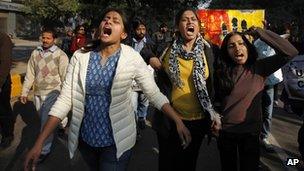Indian bill on tough rape laws passed by parliament
- Published

A bill containing harsher punishments for rapists, including the death penalty, has been passed by India's lower house of parliament.
It comes after the fatal gang rape of a student in Delhi in December sparked demands for tougher laws.
Last month, the government introduced the new rape laws in an ordinance.
After a seven-hour debate on Tuesday, members of the lower house gave their assent to the Criminal Laws (Amendment) Bill. It now passes to the upper house.
The legislation contains new penalties for stalking, groping, voyeurism and acid attacks.
However, Indian newspapers reported a low turn-out for Tuesday's vote, even though various parties had pledged their commitment to making the provisions in the bill become law.
The lower house, or Lok Sabha, was mostly empty when the vote took place, reports said, with Congress President Sonia Gandhi, her son and party Vice-President Rahul Gandhi - as well as other senior ministers - prominent among the absentees.
One well-known MP - Janata Dal (United) leader Sharad Yadav - voted against the bill, arguing that criminalising stalking and voyeurism could result in more false cases being filed against men.
The proposed new law will retain the age of consent for sex at 18 years.
The age of consent had been 16 years for three decades before the government raised it in its ordinance in February.
The government had proposed bringing it down to 16 again, amid fears that a higher age of consent would be "misusedwho disapproved of their daughters' consensual relationships with boys.
Some political parties had protested against a return to the lower age limit.
The new laws also prescribe the death penalty - which is carried out very rarely in India - in cases of rape that cause death or leave the victim in a vegetative state.
"[The] time has come to send out a loud, clear and deterrent signal that the society will not tolerate such errant behaviour," Home Minister Sushilkumar Shinde said, emphasising that the bill was being introduced to plug loopholes in the law.
Under the changes, the minimum sentence for gang rape, rape of a minor, rape by policemen or a person in authority will be doubled to 20 years and can be extended to life without parole.
Under the existing laws, a rapist faces a term of seven to 10 years.